Text
たがる
I came across this grammar point before I actually learnt it, so I remember always being confused about its meaning. Looking it up now, I realize that it's actually very straightforward.
It is simply used to refer to a third person and their wants/ intentions.
This is how to use it, as ripped off from JLPT-sensei:

弟はゲームをしたがっている。

56 notes
·
View notes
Text
This N4 Grammar Exercise 3 was really tough ٩(× ×)۶
Noting down the mistakes and learning points:

I went with ところ for this, but it's wrong because only ばかり is supposed to be used to modify nouns. I'd made a post about this before...

For this, I forgot that たら is supposed to be used with the た-form of verbs/ nouns/ adjectives.

I chose しなかった, but for this I'm not sure why it was wrong :( but I suppose since the earlier part of the sentence was in ている-form, the second part of the sentence should be the same.

I thought really hard between the correct answer and 汚したくなかった。Well, I guess getting it wrong is a good way to drill into my head, the grammar point たがる. Gonna make a post on this later!

The grammar point tested in this question is supposed to be N3 level =.= but it's okay, all part of learning XD I went with 行って as in the grammar point てもいい, which on hindsight is obviously wrong, heh
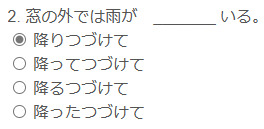
I didn't get this one wrong, but I thought that it was still important to note that 続ける (つづける) goes with the ます-form of verbs.
33 notes
·
View notes
Text
I just realized recently that I'm still not clear on what's the difference between くらい/ぐらい and ごろ. They both mean "approximately", or "around", but are used differently.
The site below helped me to understand the difference pretty quickly.
Basically:
くらい/ぐらい is used for durations of time, e.g. 2時ぐらいかかります。
ごろ is used for specifying the point in time, e.g. 2時ごろに始まります。
68 notes
·
View notes
Text
Made even more mistakes in N4 Vocabulary Exercise 2. Sobs!

I wasn't sure whether it should be 止まる(とまりました)or 止む(やみました)and ended up guessing wrong. This teaches/ reminds that tomaru is to stop in terms of movement/ action, and yamu is used for the weather.
Also to note that the kanji for them are similar (止) so one must be aware when encountering them!
While looking this up, I was once again reminded about transitive and intransitive verbs.
Transitive: paired with を and a direct object. Verbs tend to be in the form -eru.
Intransitive: paired with が and no direct object. Verbs tend to be in the form -aru.

This is a real tricky question here that I fell prey to! I went for かかります because I saw the いちじかん, but I failed to notice the particle で! かかります should be paired with が.

For this one, I am honestly a little puzzled. I chose わかい (it means young/ youthful), but apparently ちいさい is the correct answer. Is it because the sentence already mentioned kodomo, so describing them as young is redundant?

This one I didn't get wrong but was chosen out of elimination. Learning today about the vocab お礼(おれい), which is a noun that means thanks/ gratitude.
8 notes
·
View notes
Text
Darn, I was so confident in my answers for N4 Vocabulary Exercise 1, but I got 2 wrong -.-;;

I read きゅうに (急に) as きょうに (今日に)... This is why kanji is important zzz.

As for this one, it's because of the content from my "Getting Dressed" post here.
3 notes
·
View notes
Text
Many mistakes in N4 Grammar Exercise 2 hahaha, but it's okay!! More mistakes = more chance to learn!

This mistake reminds me that I'm still not familiar with the two uses of のに which I recorded before in this post.

I don't know why I chose など for this even though I know that など is used with や. Silly mistake.

I struggled to understand what this sentence was saying, but after seeing the answer, and recalling what I learnt in this post, it makes sense now. Also, I believe "ことん" is just onomatopoeia.

My answer was the first option, but I think it was wrong because the phrase continued with "するもんだから". Revising the use of し with this post.
Also, a couple of new vocab I picked up from other questions in this exercise:

うんと - a great deal, a lot, very much/ with a great amount of effort

頃 (ころ)- approximate time, suitable time, time of year.
13 notes
·
View notes
Text
N4 Grammar Exercise 1, two mistakes:

The message given by the question sounds really grim... I went with the fourth option, but I guess "かどうか" is more appropriate.

This mistake was a good lesson to teach me that までに is used for "by XXX deadline" and for verbs (actions) that are shorter in duration, and まで is used more with verbs (actions) that continue for a period of time.
までに - by the time, before
まで - until
This link explains it really succinctly.
8 notes
·
View notes
Text
ご無沙汰しています (ごぶさたしています)
I just learnt this phrase from N5 Reading Exercise 10, passage 3.
It means, "long time no see" or "I'm sorry for not contacting you for a long time", somewhat similar to お久しぶりです (ohisashiburi desu).
I've still been keeping up with my Duolingo, learning kanji, but I have not really progressed in grammar.
Anyway, I just wanted to note down the mistakes I made in this exercise:
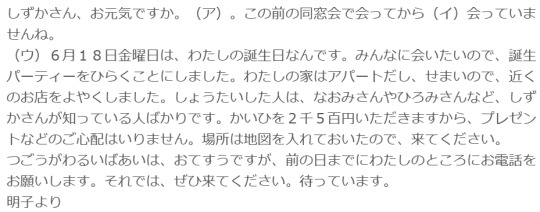
Editing this post to add that 同窓会 is read as どうそうかい。It means class reunion.

Got this question above wrong because I forgot what ほとんど meant. Need to review the stuff from this post regularly.

For this question I chose ところで (which means "by the way"), which I don't suppose is actually wrong, but じつは (which means "to tell the truth") is probably more appropriate.
ところが means "even so/ even though/ however".
#conjunctions are hard#japanese#japanese language#nihongo#japanese langblr#studyjapanese#japanese grammar#japanesevocabulary#practice
19 notes
·
View notes
Text
Attempted N5 Vocabulary Exercise 22 and got this question wrong...

I failed to notice the が. I chose ききます which should have been used with を.
7 notes
·
View notes
Text
conjugations
I struggle to remember the numerous ways verbs are conjugated, but I found this website that has a really comprehensive table!
I think the ones that I forget most easily are the passive and causative forms, so I'm going to specially mention them here for myself:
Passive form conjugates to(あ-form/ら)れる
Causative form conjugates to (あ-form/さ)せる
5 notes
·
View notes
Text
Ahem ahem, I happened to stumble upon this video clip and picked up some vocab from it:
酒池肉林 (しゅちにくりん)= sumptuous feast, debauch
眼鏡キャラ (めがねきゃら)= glasses character
ろりしょた = lolita boy
ストイック系 (すといっくけい)= stoic type
近親相姦 (きんしんそうかん)= incest
がり勉 (がりべん)= person who studies very hard
#ouran high school host club#anime#english dub#urgh#japanesevocabulary#japanese language#japanese#nihongo
7 notes
·
View notes
Text
Spamming grammar exercises today.
Starting from N5 Grammar exercise 22, got this one wrong:

~~~
Got many wrong in exercise 23...

Was careless for this.


For this question 6, honestly I think that ふります isn't wrong, but oh well. If anyone can explain to me... that would be appreciated.
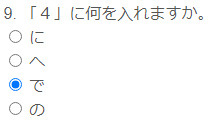
For this, looks like I still can't differentiate between the use of で and に well.
Reminder!!
に defines the location where someone or something is
で defines the location where someone does something
~~~
When will I remember that 時 (とき)is preceded by the dictionary form or the past tense form? Ahhh this is from exercise 24:

4 notes
·
View notes
Text
Got this one question from N5 Grammar exercise 20 wrong and after digging, I found that it's from Minna no Nihongo chapter 16:

もっと練習が必要だね。
0 notes
Text
I remembered this grammar rule but still got this question from N5 Grammar exercise 19 wrong:

Also, just to clarify to myself that my grammar in this following question is correct (Minna no Nihongo chapter 13), just that it doesn't fit in the sentence (I had chosen かぶりに, haha):
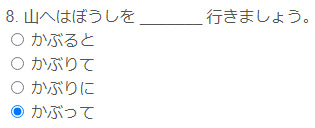
We're supposed to wear a hat to climb the mountain (Minna no Nihongo chapter 34), not climb the mountain to wear a hat XD
I got this question wrong as well but I am not sure which grammar lesson it is from, I'll have to dig:

~くします/~にします
~くします is for い-adjectives, while ~にします is for な-adjectives and nouns.
Different from なります which means "become", します is more like an instant change, so for example:
大きくなります means to grow/ to become big
大きくします means to make something big.
~~~
Also, to express that you have decided on something, one can say Noun にします.
Examples I am ripping off from the video provided below:

Just to add that from this video I also learnt that the ~く and ~に form (depending on the type of adjective used) can be added to verbs to express something like, "verb" in a "adjective" way.
Example sentences I have ripped off from the video:

youtube
14 notes
·
View notes
Text
Need more practice!! I got this wrong from N5 Grammar exercise 18:

Also I got the below question wrong because I was careless.
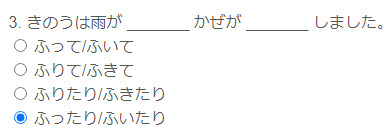
using 前に
when forming the phrase/sentence using a verb, use the dictionary form - e.g. する、食べる、のむ and add 前に.
Examples: 寝る前に / 食べる前に
when using a noun instead, add a の.
Examples: クリスマスの前に / 食事の前に
when talking about a period of time, just add 前に.
Examples: 5年前に / 三十分前に
6 notes
·
View notes
Text
Attempted N5 Grammar exercise 17 and got these questions wrong...
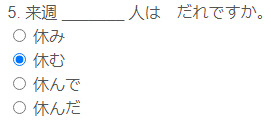
Need to remember that it's casual form or its past tense.
As for the following two, it's sadly because I read the sentences wrongly. Arghhh


describing nouns in a phrase/ sentence
Minna no Nihongo Chapter 22 teaches us how to refer to items or persons by describing them. This video really helped me with comprehending the grammar.
youtube
Self-practice sentences:
I lost the hat that you lent to me. -> あなたが私に貸した帽子をなくしました。
I remembered the promise to have dinner with my husband later. -> 後で夫と食事する約束を思い出しました。
22 notes
·
View notes
Text
Made a mistake in this N5 Kanji exercise 18:

遅 is indeed by default read as おそ(い), but in this form it should be read as おく(れる).
On the other hand, おそれる(恐れる)is a completely different word which means "to be afraid, to fear".
3 notes
·
View notes